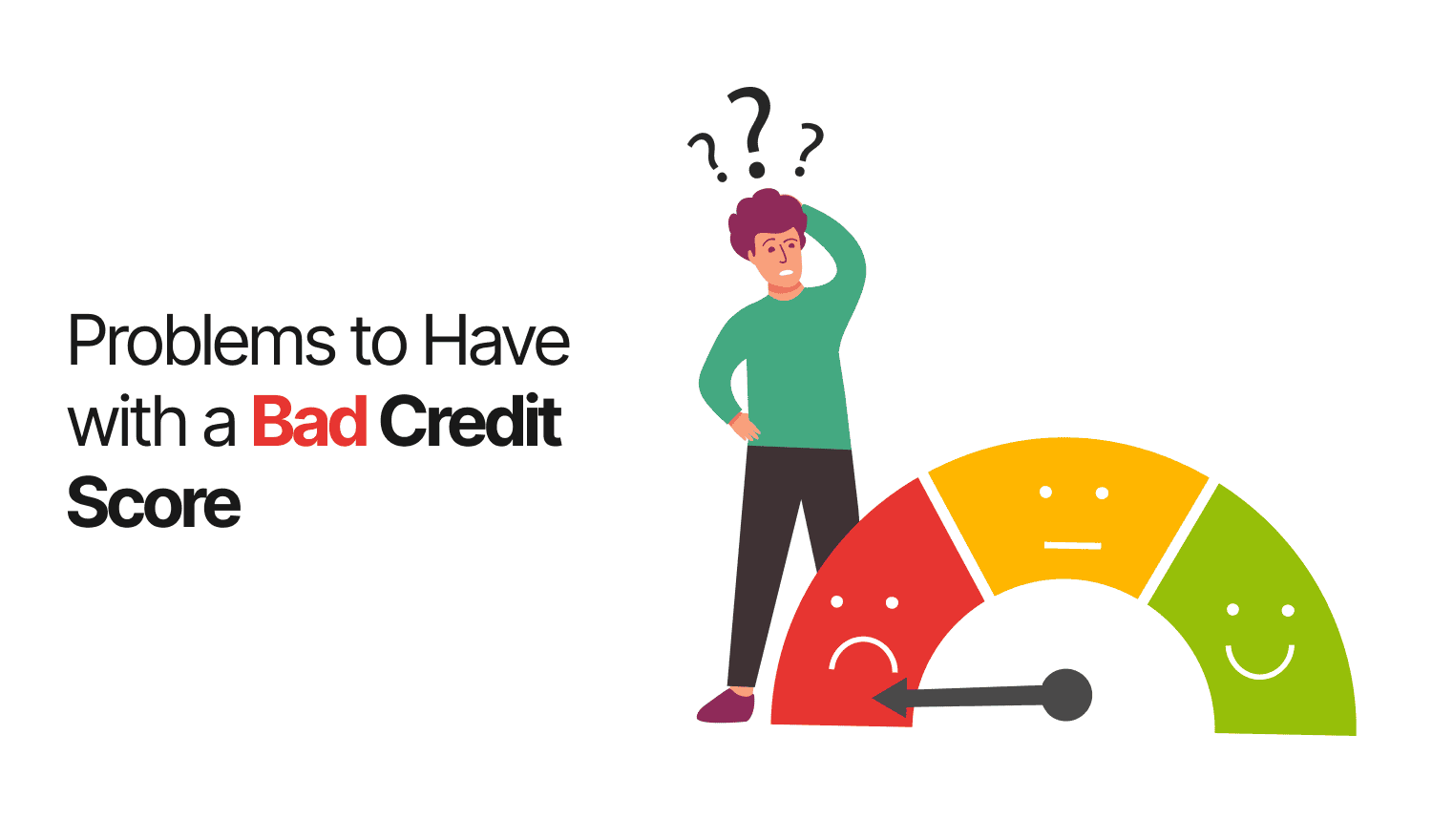Problems to Have with a Bad Credit Score

Last Updated : Jan. 30, 2025, 5:01 p.m.
Credit score is one of the most important factors that lenders look into when approving your application for loans or credit cards. A good credit score, usually above 750 indicates a higher creditworthiness and a good repayment track record. You will be seen as a person who can handle your finances responsibly and as a low risk borrower. You can obtain credit with ease. On the other hand, having a bad credit score has a lot of disadvantages. It reflects your poor credit history marked by delays in paying your credit card bills and EMIs. Other reasons for a poor credit score could be due to making multiple credit inquiries within a short duration of time, having discrepancies in the credit report, and so on. A poor credit score shows your financial irresponsibility and increases the risk for the lender. Let us now understand the problems you are going to have with a bad credit score.
Disadvantages of a Bad Credit Score
Here are some common problems of having a bad credit score:
Your Loan Application Will be Rejected
Financial institutions and banks consider it a risk to lend to a borrower with a low credit score. So, if you have a low credit score, there are very high chances that your loan application will get rejected, whatever loan it may be like a car loan, home loan, or personal loan. Even if you get the loan, you may be offered unfavorable loan terms such as a shorter loan tenure, lower loan amount, etc.
You Will Have to Face High Interest Rates
Even if a financial institution approves your loan or credit card application, you may not get the interest rates that you desire. Interest rates may be high, and you may face challenges in repaying your loan EMIs.
You Will Have to Pay a Higher Insurance Premium
Insurance companies look at your credit score when deciding on the amount of premium to be paid. A poor or low credit score gives the impression that you will not pay your premiums on time. So, insurance companies feel that it is a risk to charge normal premium prices from such individuals. So, they have to pay higher insurance premiums.
Limited Options for Credit Cards
When you have a poor credit score, you are seen as a risky borrower. Credit card issuers will get the impression that you cannot pay your credit card bills on time. So, credit card issuers will automatically reject your credit card application. Even if a credit card is given to an individual with poor credit score, it usually comes with a lower credit limit.
No Premium Credit Card Benefits
Those with a low or poor credit score cannot avail premium credit card benefits such as welcome offers, higher credit limits, cashback, discounts, etc. People with good credit scores can avail these benefits
What Leads to a Bad Credit Score?
Here are some reasons for a bad credit score.
Payment Defaults
Missing to pay on time can lead to a bad credit score. Your repayment history makes up to 35% of the credit score. Each default can bring down your credit score by a few points and add to the negative credit history.
For example: Peter misses 3 EMI payments for a personal loan continuously. Consequently, his credit score drops from 700 to 625. If Peter continues to default on his payments, his credit score will continue to drop further, thus making it hard for him to obtain future credit
Solution:
Ensure to pay your loan EMIs and credit card bills on time. Set auto payment and payment alerts so that payments are not skipped. Also, pay the credit card bill in full whenever possible, since the carried forward balance accrues interest. Frequently paying only the minimum amount due will lead to accumulation of outstanding amount and eventually it will become very difficult to pay your EMIs. It may even lead to a debt trap.
High Credit Utilization Ratio
A high credit utilization ratio can impact your credit score negatively. Your CUR must be within 30% or 40%. Using more than that gives the impression that you are overdependent on credit and will be unable to repay your debts back. CUR makes up about 30% of your credit score. Having a high CUR will lower your credit score.
Solution: Use the credit limit available judiciously. Try to keep it within 30 to 40%
Not Checking Your Credit Report
Not checking your credit report regularly can impact your credit score negatively. This is because there could be some erroneous information entered in your report which could be detrimental to your credit score. In that case, checking the report will help you identify them. Then, you can raise a dispute with the credit bureau and get it rectified.
Solution: Check your credit report regularly for accuracy and take essential steps to correct errors.
Applying for New Credit
Applying for new loans just to pay your current EMIs or bills is not a good idea. It contributes to a decrease in your credit score. This reflects your poor financial management and credit hungry behavior, which is quite alarming to lenders.
Solution:
Do not apply for a new loan just to repay an existing debt.
Having Multiple Credit Accounts
Opening multiple credit accounts can lead to a poor credit score. This is because you may find it difficult to manage several credit accounts, miss payments, and accumulate debts.
Solution: Open new credit accounts only when necessary and build a healthy credit history.
Frequently Asked Questions (FAQs)